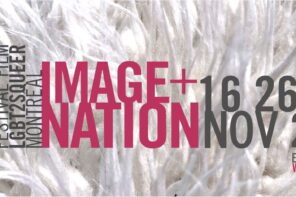On October 14th, I logged on to Zoom for one of the highly anticipated events of McGill’s Queer History Month, “Love Poems for the End of the World.” It had been a while since I had participated in a writing workshop, but this one workshop seemed like a real treat in between my midterms and a welcome chance for some breathing room.
This workshop was led by a two-spirit individual named Smokii Sumac. Smokii has previously participated in McGill’s Queer History Month, as well as McGill’s Indigenous Awareness Week, and I was very excited to hear him again. The event began with a land acknowledgement and a brief introduction by Meryem Benslimane, the coordinator of Queer History Month. ASL interpreters, as well as a person typing closed captions, ensured the event was accessible for everyone.
Smokii’s event was one part writing workshop, one part poetry reading, and one part open discussion. He read several of his poems, and in between readings, we had a few minutes to write some of our own. As in most writing workshops, we were then encouraged to share our poems.
[Smokii] discussed how love can be found in all kinds of relationships, not just romantic ones.
This workshop was the perfect size: no more than twenty five people in the Zoom at any given moment. The chat was active with people greeting each other and adding to what Smokii said, or sharing links if he mentioned an artist or a book.
I was pleased to find that Smokii’s definition of a love poem is broad. He discussed how love can be found in all kinds of relationships, not just romantic ones. He also emphasized the importance of connecting with others, especially during a pandemic.
For our first exercise, we were encouraged to make a list of things we love, including people, feelings, food, and objects: anything that filled us with a sense of joy. One of the love poems he read was about an old car and the road trips he’d experienced in it with his aunt. Another was for his cat, Miss Magoo.
During the writing periods, Smokii encouraged us to explore his preferred poetic format of the haiku. The rules for composing a haiku are simple: the poem is only three lines, with five syllables in the first, seven in the second, and five in the third. Although it is a limited format, Smokii chose it for one important reason: it works well for poets of any skill level. Even if you have never written poetry before, you can write seventeen syllables.
Smokii also made sure to let everyone know that the workshop was for everyone, not just for experienced poets. He said: “I wrote poetry for years, and I didn’t feel like a poet until I was invited to the Canadian festival of spoken word. It doesn’t matter if your poetry doesn’t make money. In fact, it can be better to take a moment of reflection. Give yourself that permission and space. Our [creative] work is sips of water as we are in a drought, and we need to access that life force within us.”
…one thing that truly resonated with me was his idea of poetry as a form of self-care.
One of the things I enjoyed the most about this event was the genuine conversation that sparked between the participants. Smokii shared stories about his life, and he encouraged us to share snippets of ours. We even got to see his adorable, especially large puppy on the Zoom screen. While Smokii was definitely in charge of making the event run smoothly, but he was open to letting the discussion flow naturally, and he elaborated on certain subjects according to participants’ interest.
Smokii had much wisdom to share during the workshop, but one thing that truly resonated with me was his idea of poetry as a form of self-care.
“We need to think of poetry as a moment for ourselves and to ourselves,” Smokii said. “Looking at poetry is deeply important. Taking time for yourself can really help you learn and grow [as a person]. Oral tradition is a big thing for [Indigenous peoples], and poetry is part of that.”
I’ve been to many Zoom events since the start of the pandemic, and I can safely say that this workshop was the best one. Everyone involved was incredibly kind and welcoming, and it really felt like we were all in the same room together. There was a great atmosphere, and I felt that I was really able to connect with other participants.
In a society that is so focused on ensuring maximum productivity, even during difficult circumstances, it can be hard to find a reason to exist outside one’s work and projects.
Smokii ended the workshop with an affirmation that I found particularly soothing: “we are necessary by way of our creation.” This statement moved me. I have spent the last few days thinking about it, and I am beginning to put my finger on why it affected me so much. In a society that is so focused on ensuring maximum productivity, even during difficult circumstances, it can be hard to find a reason to exist outside one’s work and projects. If I can’t find a defined purpose for every second of my day, how will I feel useful?
Smokii’s “Love Poems For The End of the World” workshop reminded me that it is not only alright to just exist, but that taking a step back sometimes is necessary in order to survive. Despite everything going on right now, it is still crucial to take a moment to sit back and reflect. I am profoundly grateful to Smokii for giving us a time and a place to do so, and encouraging us to try finding these small moments to breathe in our lives.








